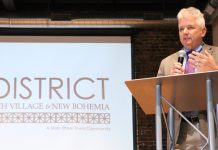
Regionalism isn’t dead, but it might be dying.
A recent example of the continued decay surfaced when Cedar Rapids Mayor Tiffany O’Donnell led an effort to reduce the city’s investment in the Cedar Rapids Metro Economic Alliance from $75,000 to $25,000.
The reduction didn’t surprise us, because Ms. O’Donnell has been foreshadowing the change for some time.
Regionalism has been flailing for years.
Until there are tax-revenue-sharing agreements across city and county boundaries or significant structural changes to economic development organizations, these politically motivated maneuvers will only continue.
“Cedar Rapids is the driver of the metro economy,” Ms. O’Donnell said during her State of the City speech on May 2, 2023. She added that her definition of regionalism is having the best Cedar Rapids possible. “We take that very seriously and are committed to living up to the expectation by putting more talent and resources on the plate.”
To be clear, we don’t begrudge Ms. O’Donnell or other mayors and city managers for having a “my-community-first approach” to everything from economic development to workforce. After all, mayors don’t get elected and city managers don’t get compensated for economic development successes outside of their political boundaries.
We do think it is shortsighted, however.
To be sure, the location of a new factory or expansion of a company has real tax revenue implications for a city.
But that new factory or expansion of a company will hire employees from outside of that city. It will sell to clients and markets from outside of that city. It will utilize vendors from outside of that city.
In other words, it doesn’t take a village. It takes a region to make a business and economy work.
Another way to think about it is: Would the Eastern Iowa Airport or Kirkwood Community College or United Fire Group or Van Meter be financially successful if it just had employees, students and patrons from within the city limits of Cedar Rapids? Of course not.
The private sector gets regionalism and sees these political machinations as misguided, but it has grown timid on fighting for regionalism because, very simply, the Cedar Rapids/Iowa City Corridor region doesn’t have a so-called burning platform — a disaster or economic calamity — that is compelling the region to make political and structural changes.
Both the Cedar Rapids/Marion/Linn County and the Iowa City/Coralville/Johnson County areas are doing quite well. If we do nothing, then economic development will probably still be OK.
But if we did something — something substantial — then we could transform the region into an economic powerhouse. But it takes leadership, commitment and money, primarily from the private sector.
There are economic models out there that our region should examine. Minneapolis-St. Paul, for example, has had a successful regional tax-base-sharing agreement for over 50 years. The Green Bay region has an innovative economic development organization called New North, which is only funded by the private sector and provides “vital resources, talent and support to the New North Corporation in order to promote the New North region” in 18 counties in northeast Wisconsin.
Regionalism doesn’t have to die, but it will unless the private sector starts to get less timid and starts to lead.



